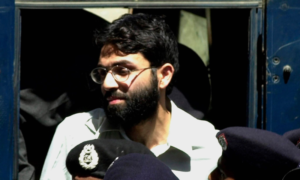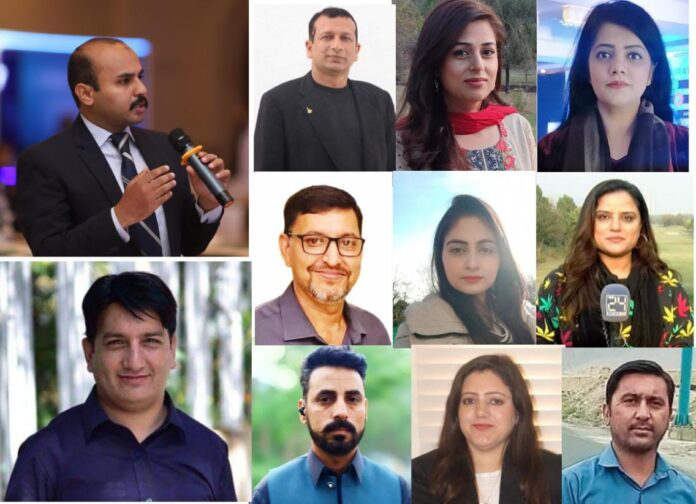Pakistan’s Supreme Court orders release of prime accused in Daniel Pearl murder
The Supreme Court on Thursday ordered authorities to release Ahmed Omar Saeed Sheikh, the principal accused in the 2002 beheading of American journalist Daniel Pearl, dismissing an appeal by the Sindh government against the Sindh High Court (SHC) order for his immediate release.
The apex court is also separately hearing appeals against the high court’s earlier acquittal of Sheikh, a decision on which has not been announced as yet.
The short order was issued by a three-judge SC bench headed by Justice Mushir Alam. One member of the bench opposed the decision.
“The court has come out to say that there is no offence that he has committed in this case,” Mahmood Sheikh, who represented Sheikh, told AFP.
The attorney added that the court had ordered that three others, who had been sentenced to life in prison for their part in Pearl’s kidnapping and death, also be freed.
“Today’s decision is a complete travesty of justice and the release of these killers puts in danger journalists everywhere and the people of Pakistan,” the Pearl family said in a statement released by their lawyer.
Faisal Siddiqi, the Pearl family lawyer, said the only legal avenue following the court’s decision upholding Sheikh’s acquittal would be to ask for a review of the court decision.
However, he said the review would be conducted by the same court that upheld the appeal. “In practical terms there is no further legal avenues to pursue in Pakistan,” he said.
Earlier, the United States had said that it may seek to try Sheikh if efforts to keep him in prison failed.
In a statement last month, the then-US acting Attorney General Jeffrey Rosen said that America “stands ready to take custody of Omar Sheikh to stand trial here” after the SHC overturned a government detention order that Sheikh should remain in custody.
On Wednesday, Sheikh — after 18 years of denial — told the SC he played a “minor” role in the killing.
A letter handwritten by Sheikh in 2019, in which he admits limited involvement in the killing of the Wall Street Journal reporter, was submitted to the Supreme Court nearly two weeks ago. It wasn’t until Wednesday that Sheikh’s lawyers confirmed their client wrote it.
Nowhere in the three-page letter addressed to the SHC did the British-born Sheikh elaborate or say exactly what his allegedly minor role in Pearl’s slaying involved.
Daniel Pearl, 38, was doing research on religious extremism in Karachi when he was abducted in January 2002. A graphic video showing his decapitation was delivered to the US consulate a month later. Subsequently, Sheikh was arrested in 2002 and sentenced to death by a trial court.
In its April 2, 2020, order, the SHC had overturned the conviction of Omar Sheikh for killing the South Asia bureau chief of The Wall Street Journal but had maintained his conviction on a lesser charge of abetting the kidnapping, for which he was sentenced to seven years in prison.
Since Sheikh had been incarcerated since 2002, that sentence was counted as time served by the high court. The SHC had also acquitted three other men namely Fahad Naseem, Sheikh Adil and Salman Saqib, who had been earlier sentenced to life imprisonment by an Anti-Terrorism Court in Karachi.
After their acquittal on charges of murder, instead of releasing the men, the provincial government placed them under 90-day detention under the Maintenance of Public Order (MPO) Ordinance, saying their release posed a threat to security.
n July 1, a fresh notification under the Anti-Terrorism Act, 1997, was issued to extend their detention by three months and later their confinement was extended for yet another 90 days.
But in December, the high court accepted a petition by the men against their continued detention and ordered their immediate release, declaring all notifications of the Sindh government related to their detention “null and void”.
Following the SHC order, the Sindh government had filed an appeal with the Supreme Court against Sheikh’s release. The government and Pearl’s parents had also filed appeals against Sheikh’s acquittal, a decision on which has not yet been announced by the apex court.
During today’s hearing, the Sindh advocate general told the court that the prime accused had links to banned outfits. He said that the provincial government had handed over sensitive information to the court in a sealed envelope. “There is evidence but not enough to prove it in court,” he said.
At this, Justice Umar Ata Bandial remarked that the evidence handed over to the court had not been presented earlier “at any forum”.
“How can we review information that is not a part of any record?” he questioned.
Justice Muneeb Akhtar said that government had not declared the accused as an “enemy agent”. “No one knows when the war against terrorism will end. The state declaring its citizens as an enemy is dangerous in itself,” he said.
Source: Dawn/Reports
Additional input by AFP and AP


